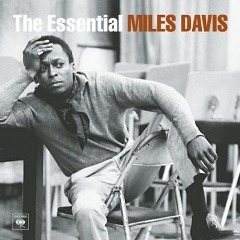Miles Davis – The Essential (2001)
Miles Davis – The Essential (2001)

CD1
1.Now's the Time — 3:17 play
2.Jeru — 3:13
3.Compulsion — 5:44
4.Tempus Fugit — 3:51
5.Walkin' — 13:27
6.'Round Midnight — 5:57
7.Bye Bye Blackbird — 7:55
8.New Rhumba — 4:37
9.Generique — 2:48 play
10.Summertime — 3:20
11.So What — 9:23
12.The Pan Piper — 3:53
13.Someday My Prince Will Come — 9:03
CD2
1.My Funny Valentine — 15:07
2.E.S.P. — 5:30
3.Nefertiti — 7:53
4.Petits Machins (Little Stuff) — 8:07
5.Miles Runs the Voodoo Down — 14:03
6.Little Church — 3:16 play
7.Black Satin — 5:16
8.Jean-Pierre — 4:03 play
9.Time After Time — 3:40
10.Portia — 6:18
Personnel :
Personnel: Miles Davis- trumpet, organ on "Jean Pierre;" Charlie Parker- alto saxophone, tenor saxophone on "Compulsion;" Lee Konitz, Julian "Cannonball" Adderley- alto saxophone; Sonny Rollins, Jimmy Heath, Lucky Thompson, Barney Wilen, Hank Mobley, George Coleman, John Coltrane- tenor saxophone; Wayne Shorter- tenor saxophone, soprano saxophone; Carlos Garnett, Bill Evans- soprano saxophone; Gerry Mulligan- baritone saxophone; Danny Bank- alto flute, bass clarinet; Bennie Maupin- bass clarinet; Sid Cooper- clarinet; Al Block, Harold Feldman- flute; Romeo Penque- oboe; Jack Knitzer- bassoon; Jerome Richardson, Romeo Penque- flute, alto flute, clarinet; Ernie Royal, Bernie Glow, Louis Mucci, Taft Jordan, Johnny Carisi, Johnny Coles- trumpet; Kai Winding, J.J. Johnson, Frank Rehak, Jimmy Cleveland, Joe Bennett, Dick Hixon- trombone; Tom Mitchell- bass trombone; Junior Collins, Willie Ruff, Jimmy Buffington, Julius Watkins, Joe Singer, Tony Miranda, Gunther Schuller- French horn; Bill Barber- tuba; J anet Putnam- harp; Khalil Balakrishna- electric sitar; John McLaughlin, Reggie Lucas, Mike Stern, John Scofield- electric guitar; Dizzy Gillespie, Al Haig, Walter Bishop, Gil Coggins, Horace Silver, Rene Urtreger, Bill Evans, Red Garland, Wynton Kelly- piano; Herbie Hancock- piano, electric piano; Chick Corea, Larry Young- electric piano; Keith Jarrett- organ; Cedric Lawson, Robert Irving III- keyboard; Curley Russell, Joe Shulman, Percy Heath, Pierre Michelot, Paul Chambers- bass; Dave Holland, Ron Carter- bass, electric bass; Harvey Brooks, Darryl Jones- electric bass; Max Roach, Philly Joe Jones, Art Blakey, Kenny Clarke, Art Taylor, Jimmy Cobb, Tony Williams, Jack DeJohnette, Billy Hart, Al Foster- drums; Don Alias- drums, congas; Badal Roy- tabla; Airto Moreira, Elvin Jones, Jose Mangual, Lennie White, Jumma Santos, Paulinho Da Costa, James "Mtume" Foreman, Mino Cinelu, Steve Thornton- percussion; Hermeto Pascoal- whistling; Marcus Miller- synth, keyboards, electric bass, soprano saxophone, sampling.
It is possible to boil a musician's extensive career down into two CDs. In honor of what would have been trumpeter Miles Davis' 75th birthday, Columbia/Legacy Recordings has compiled The Essential Miles Davis, a collection that spans nearly four decades of Davis' eclectic career. From "So What" to "Miles Runs the Voodoo Down," Davis never stopped experimenting with new ideas and sounds. He made the blues his own. He added orchestra instruments to his lineup. He turned pop standards into jazz jewels. He gathered some of the greatest musicians to perform and stretch their creative boundaries. He combined rock 'n' roll rhythms and electronic instruments with jazz improvisation, creating a rift within the jazz community.
This collection does a nice job giving snippets of Davis' long and winding road. There are the usual suspects: a song from the groundbreaking Birth of the Cool; tracks from Davis' collaborations with arranger Gil Evans; a tune from Kind of Blue that made mode scales fashionable; a song from the genre-bending album Bitches Brew. And the list of people Davis collaborated with on these recordings is phenomenal: Charlie Parker. John Coltrane. Horace Silver. Gerry Mulligan. Sonny Rollins. Tony Williams. Chick Corea. John McLaughlin. But it's the lesser-known songs on the collection that deserve attention. Davis' solo on "Generique" from the French film "Ascenseur pour L'echafaud" is melancholy, yet soulful (the echo certainly adds to the mystery). "Nefertiti" is a simple melody played by Davis and saxophonist Wayne Shorter throughout the piece, leaving the rhythm section to doodle around.
Davis' songs from late 1960s and early 1970s may seem unsettling to the ears at first, but you'll begin to appreciate his electronically altered trumpet sound for the haunting "Little Church." In all, The Essential Miles Davis provides listeners with the most important and influential recordings of this jazz legend.<
Oto niewątpliwie najlepsza i najbardziej panoramiczna retrospektywa Milesa Davisa, jaką kiedykolwiek zebrano - powiadają pierwsze słowa omówienia na okładce niniejszego podwójnego albumu. I trzeba przyznać, że to święta prawda. Ponad czterdzieści lat życia twórczego człowieka, który co najmniej przez trzy czwarte tych lat był absolutnym przywódcą i guru nie tylko jazzowego środowiska. Około dwustu płyt, z czego mniej więcej sto pięćdziesiąt to absolutne skarby, nie do pominięcia wśród "stu najlepszych w historii", jeśli taki rachunek jest do przeprowadzenia. I to wszystko na dwu kompaktach - istotnie, najbardziej panoramiczna retrospektywa jaką można sobie wyobrazić. Żaden muzyk, żaden zagorzały meloman nie dałby się opędzić takim zbiorem. To tak, jak zwiedzić cały świat, ale z pokładu sputnika.
Davis' songs from late 1960s and early 1970s may seem unsettling to the ears at first, but you'll begin to appreciate his electronically altered trumpet sound for the haunting "Little Church." In all, The Essential Miles Davis provides listeners with the most important and influential recordings of this jazz legend.
download (mp3 @320 kbs):
uploaded yandex 4shared mega mediafire solidfiles zalivalka cloudmailru oboom
Zmieniony (Środa, 11 Luty 2015 11:16)








